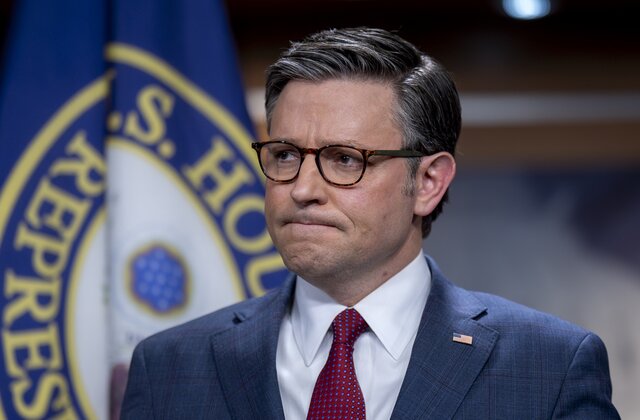The House Speaker, belonging to the Republican Party from Louisiana, Mike Johnson, had some sharp words of criticism last Saturday. His critiques were targeted at Democrats who waved Ukraine’s flag in the House chamber after voting in favor of extending military aid to Ukraine. Other Republicans also voiced their concerns about pushing this vote forward without guaranteeing sufficient funds for bolstering measures at the borders.
For Johnson, his contention was pitched against his colleagues on the opposing side, who wanted to go forward with foreign aid schemes without a defined strategy for funding security at the borders first. The votes for each aid clause were held separately, the most significant one being the $60 billion for Ukraine, marking a pivotal move.
An array of other international aid proposals were also on the table. A total of $17 billion was considered for Israel, $9 billion was proposed for humanitarian aid purposes, and $8 billion was raised for Taiwan’s security support. In a further move to shield national considerations, a bill to possibly prohibit the social media platform TikTok if not disengaged from Chinese management was likewise endorsed.
In the heat of the debate, and following the decisive voting, numerous Democrats engaged in an impromptu display of solidarity for Ukraine. Igniting the House chamber with spirited chants of ‘Ukraine!’, they waived the blue and yellow flags, symbolizing the European nation. This explicit gesture was met with sharp retort from their Republican counterparts.
Unfazed by the actions of the opposition, Speaker Johnson articulated important dimensions of the bills. He asserted that the legislation would bring a higher degree of responsibility over the funds allocated for Ukraine. The bill essentially proposes that it would outline an exit strategy for the ongoing strife in Ukraine.
According to the Speaker, an essential principle of the recently passed foreign aid legislation is that it includes a financial instrument. The financial instrument is embedded within the aid package to Ukraine and the implied REPO Act, which targets Russian assets to offset a portion of the costs – a strong message to those following geopolitical developments.
Mr. Johnson emphasized vigilance over the spending by proclaiming, ‘We will continue to keep an eye on every dollar that we’re using and investing at this time.’ The sentiment reflects a commitment to oversight, even in a moment where the focus centers on international aid.
In making his case, he fell back upon a weighty military expression, saying it again for added emphasis. He proposed a set preference: to send ammunition to overseas conflicts instead of deploying American servicemen and servicewomen.
He signaled his belief that this important junction offers a chance for crucial judgement. This could help determine whether or not to invest more in financial aid rather than risking American lives in overseas conflicts. The decision, as he pointed out, rightly rests in the hands of the House.
In conclusion, Johnson reflected on the gravity of these developments with hope, suggesting that the Senate might likely produce a similar verdict. His passion is palpable, highlighting the urgency of these decisions and the importance of maintaining fiscal accountability amidst the mounting tension.
From the House chamber that day, an eventful and heated series of debates and discussion echoed through the heart of Washington. It underscores the complexity and responsibility of deciding the nation’s stance on international affairs, as well as the balance of power woven within.
While the debates sparked contention, the commitment shown by both sides to uphold their values and protect their nation was unmistakable. The day’s events unfolded to shed light on the compromises and decisions made behind each policy, resonating with the notion of sustained faith in the democratic process.
Suffice it to say, the occurrences of the House chamber that day were a testament to the tension between aiding allies abroad and fortifying security at home. Such are the hard choices our government faces, commanding immense respect and understanding of what is at stake on the global stage.


